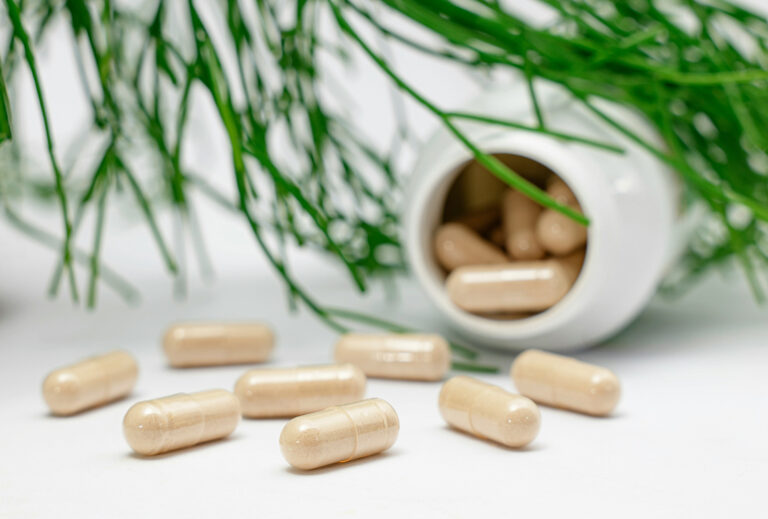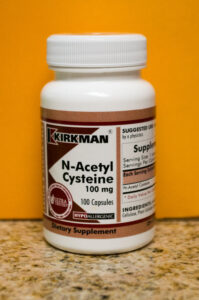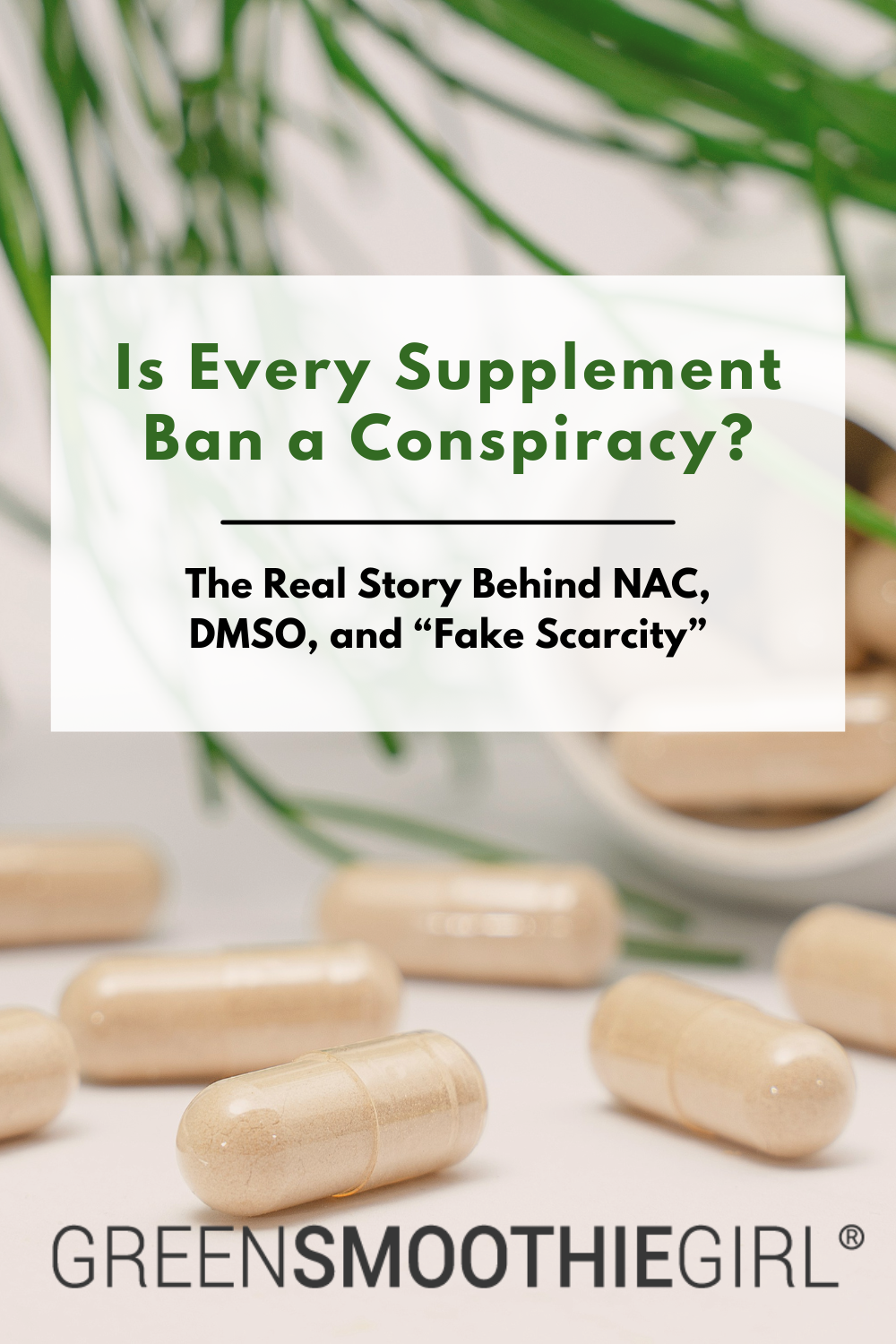Is Every Supplement Ban a Conspiracy? The Real Story Behind NAC, DMSO, and “Fake Scarcity”

Few things stir up wellness communities more than hearing a supplement might get banned.
The conversation usually goes like this: “If they’re pulling it off the shelves, it must work – and Big Pharma doesn’t want us to have it.”
It’s a powerful story. But is it true? Not always.
Let’s take a closer look at two supplements you’ve probably heard about in recent years: NAC and DMSO.
Why We Love the Conspiracy Story
At the heart of this narrative lies a deep mistrust of pharmaceutical companies and regulators. This skepticism often finds fertile ground online, where anecdotes and fears travel faster than fact.
The idea is seductive: Here’s a natural solution, a simple supplement, that “they” don’t want you to have because it threatens pharma and allopathic medicine.
Yet, the real reason behind a supplement’s sudden scrutiny is often more complex.
In many cases, it isn’t about hiding effective remedies – it’s about the blurry line between supplements and drugs, and how to keep consumers safe.
[Related: Why I Won’t Take 99% of Supplements Anymore]
When Supplements Are Really Drugs

Truth: the popular NAC supplement is not "natural."
Take N-acetyl cysteine (NAC) and dimethyl sulfoxide (DMSO) as examples.
Both have long histories as over-the-counter supplements, celebrated by some as miracle cures for a wide array of ailments.
NAC (N-acetyl cysteine)
- Used for decades in hospitals to clear mucus in the lungs and treat acetaminophen poisoning.
- Is a drug component of many psychotropics.
- Marketed as an antioxidant supplement for immunity and mental health.
- Fun fact: it’s not “natural.” NAC is made from L-cysteine, which often comes from duck feathers, hog hair, or human hair.
DMSO (dimethyl sulfoxide)
- Originally, it was an industrial solvent made from wood pulp, a byproduct of the lumber industry.
- Later sold as a pain-relief and anti-inflammatory supplement.
- Also not “natural” – it’s a chemical carrier that helps substances penetrate tissues.
Both have real drug-like effects, recognized as such by the medical and regulatory establishments. That’s why regulators treat them differently from, say, vitamin C.
There’s nothing “natural” about either one of them.
Both involve chemical manufacturing, utilizing industrial byproducts as source materials, solvents, and various chemicals to preserve, stabilize, and function in spray bottles, pressed pills, or other formats.
That dual identity creates a legal and ethical gray area. If a substance can exert powerful effects on the body, and if it is made of entirely synthetic and often toxic ingredients:
Should it be freely available as a supplement, or should it be subject to the same rigorous controls as pharmaceuticals?
The Marketing Spin: Fake Scarcity
Here’s where things get messy.
When the FDA reviewed NAC a few years ago, claiming it might not qualify as a supplement since it was first approved as a drug in the 1960s, panic set in.
Supplement companies jumped on the news. They warned that NAC could “disappear forever” – and sales exploded.
Fear of missing out (FOMO) is the best sales tool in the world.
I fell for it myself in 2021. I bought 10 bottles of NAC for $400 – bottles I later threw out after realizing I didn’t need them. Ouch.
The same story has played out with DMSO, which remains in a strange gray zone: allowed for certain medical uses, but not freely sold as a consumer product because of concerns about dosing, purity, and side effects.
Not Always a Conspiracy
It’s tempting to believe every supplement ban is a Pharma plot. But often, the truth is simpler:
- The supplement isn’t really “natural.”
- It has strong drug-like effects.
- Regulators aren’t sure if it belongs in the supplement aisle or behind the pharmacy counter.
Yes, sometimes companies and regulators act out of self-interest. But other times, it’s about consumer safety and legal definitions of what counts as “medicine.”
What This Means for You
Next time you hear a supplement is “under attack because it works,” pause before stocking up. The real story is usually more about regulation, safety, and blurred definitions than a grand conspiracy.
And here’s a reality check: functional medicine doctors are often selling synthetic products, too – even when patients believe they’re “all natural.”
Why? Because patients want the easy fix, not the discipline of lifestyle change.
That’s the uncomfortable truth: Pills sell better than long-term habits.
Final Takeaway
Supplements like NAC and DMSO will keep sparking debates. But the best protection against hype is knowledge.
Don’t fall for fake scarcity marketing. Don’t assume “natural” means harmless. And don’t confuse regulatory debates with proof that a product works.
If you want to save yourself money (and a lot of stress), read my book, Take Daily. It exposes the myths of the supplement industry and shows you how to stop wasting money on fear-driven purchases.

Disclosure: This post may contain affiliate links that help support the GSG mission without costing you extra. I recommend only companies and products that I use myself.

Image notes
- NAC image used under the Creative Commons Attribution-Share Alike 4.0 International license via Ppelleti
Posted in: Natural Products, Natural Remedies, Supplements
















So what do you think of NAC and DMSO? Is it just a matter of works for some people but not others? Safety issues?
Yuck, didn't know NAC was made from those products. I would take NAC randomly, cause I too bought a lot, thinking Oh no, it won't be sold any longer. It has helped me when I felt a cold coming on or when my lungs start feeling heavy – it worked. I love DSMO, works wonders for me.